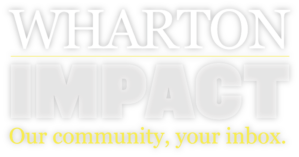December 2021 • Edition 4
In this edition we learn about a gift that has generational roots; how the buzz is building for Reunion; and what leaders can learn from the new workplace normal.
Honoring His Father by Investing in the Future

Robert L. Dilenschneider is not a Wharton alumnus, but he is a Wharton donor. Along with his wife Jan, Robert created a fund to honor his father, S.J. Dilenschneider, W’28, who made lasting impacts in business and journalism.
The Dilenschneider fund provides financial support for student ventures that explore or expand communications through business. The first recipient of the Dilenschneider Award, Cyrus Karai, WG’21, is making his own nascent impact in the world of insurance.
Robert Dilenschneider, who is an acclaimed powerhouse in public relations and who has authored a series of best-selling motivational books, speaks about his father with love and affection. Dilenschneider père rose from a childhood as a once-barefoot newspaper seller to overseeing dozens of media properties within the Scripps-Howard newspaper empire.
“My father’s life and career have been outstanding examples to me,” Dilenschneider said. “This gift to the Wharton School is keeping his spirit alive by inspiring today’s entrepreneurs.
“Wharton gave my dad the ability to take his life to a new level. If my gift can inspire a similar kind of accomplishment, then I’m pleased to contribute.”
Dilenschneider cares deeply about who shapes tomorrow. Through his own storied career, he has counseled major corporations, professional groups, trade associations, and educational institutions, and has assisted clients in dealings with regulatory agencies, labor unions, and consumer groups, among others.
Underlying his multi-faceted work is concern for the future of a civil society, a priority he is also addressing through his philanthropy.
“Giving back through philanthropy is a way to keep your feet firmly planted,” he said. “Nothing is better than being better than who you were. Civility is a tough battle, but it is worth the fight.”
The Great Reunion Return to Campus

No doubt about it: Reunion is a flagship event for the Wharton School — and Shannon Connelly, executive director for alumni relations, has the statistics to prove it. She also has her finger on the pulse of the “come back/give back” mantra at the core of the event. However, for the classes attending Reunion in May, the emotional heartbeat is set to be the joy of, again, gathering in person.
Connelly is expecting about 3,000 alumni and their guests to attend. “I’m getting the feeling alumni are beyond excited,” she said. “These classes have been waiting a long time to come together.”
Particular attention is being paid to young alumni classes that have been especially impacted by the pandemic. “Wharton is placing focus on these young alumni by gathering together two classes (WG’20 and WG’21) for a weekend in May 2022 that is separate from all the other Reunions. This additional weekend will be wholly dedicated to these two classes.”
According to Connelly, class gift giving is an important component of the Reunion landscape: “More people give back than come back, and we are proud of that. Even if they can’t make it to the event, they are making gifts in honor of their milestone.”
- Giving spikes on average about 10 percentage points in a Reunion year (around 28 percent vs. 18 percent during an off cycle), with some classes seeing giving as high as 50 percent.
- Reunions are volunteer-led and volunteer-driven; in 2019, there were 296 volunteers, and 78 percent of these alumni volunteers contributed to The Wharton Fund, which supports the School’s existing programs and invests in new opportunities.
Connelly said Reunion offers alumni opportunities to re-experience their Wharton education by attending bespoke lectures, networking across class years, and igniting ideas and interests that will last well beyond the event.
The Leadership of Tomorrow Begins Today

As a thank-you to donors who contributed to Wharton’s $1 billion More Than Ever campaign, Management Professor Mike Useem spoke to more than 100 remote guests about his new book, The Edge: How Ten CEOs Learned to Lead — And the Lessons for Us All.
“We can always be learning about leadership,” Useem said during the November event. “Leadership is about managing change, and haven’t we learned in the past 20 months the world is changing?”
“Your own individual contribution makes the most difference when the world is uncertain. But, get your leadership formula correct, and then leadership becomes a team sport when you respect the leadership capacity within your team.”
Useem addressed the changing paradigm of the “big boss.” “The idea of the all-knowing boss is a model from the 1980s and 1990s,” he said. Especially post-pandemic, he added, “Employees expect to be known and to be treated with respect. The boss is now out of the high castle.”
He said now is the time to invent a future where leadership is “off its pedestal” and leaders are behaving in a way that is approachable and that shows regard for employees.
Citing leaders such as Johnson & Johnson CEO Alex Gorsky, WG’96; retired IBM CEO Ginni Rometty; and Walgreens Boots Alliance CEO Rosalind Brewer, WAM’01 and how they successfully manage change, Useem said, “How much of a difference you make as a leader is down to your leadership capabilities.”
Useem further advised on not leaving the norms and values of company culture to chance. “Company culture is an active instrument of leadership,” he said. “Think about how you’d like things to be in the future and bring those ideas into the present. Focus on how you can do things differently now.”




